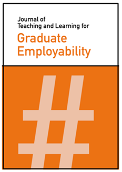Student parents and carers need graduate employability support: Recommendations for employability practitioners
DOI:
https://doi.org/10.21153/jtlge2024vol15no2art2029Keywords:
Equity, graduate employability, higher education, student parent and carersAbstract
Universities and their employability-related staff must address the inequities that claim diversity as a disadvantage and a barrier to securing work integrated learning and graduate employment. With increases in equity groups enrolling at university there is a need to ensure access to employability opportunities. Graduate employability should be an accolade for students however it is not accessible, and ubiquitous for all. Student parents and carers are an invisible cohort that needs to be identified, and supported with their employability as they are a significantly growing population in higher education. This provocation will present the current landscape at university and offer three recommendations: the integration of career development learning and work experiences; data-informed systems and procedures; and collaboration and research into ‘employability for inclusion.’ This is required to build staff capability and organisational capacity and prepare our future workforce that is representative of today’s society.References
Andrewartha, L., & Harvey, A. (2021). Supporting carers to succeed in Australian higher education. La Trobe University. https://doi.org/10.26181/60ee1cda518e2
Andrewartha, L., Knight, E., Simpson, A., & Beattie, H. (2022). A balancing act: supporting students who are parents to succeed in Australian higher education. La Trobe University. https://doi.org/10.26181/19179719.v1
Andrewartha, L., Knight, E., Simpson, A., & Beattie, H. (2023). Balancing the books: how we can better support students who are parents. Journal of Higher Education Policy and Management, 45(2), 160-173. https://doi.org/10.1080/1360080X.2023.2180164
Australian Bureau of Statistics (2023, June). Education and Work, Australia: Data on engagement in work and/or study, current and recent study, qualifications and transitions to work. https://www.abs.gov.au/statistics/people/education/education-and-work-australia/latest-release
Baker, S., Xavier, A., Due, C., Dunwoodie, K., & Newman, A. (2023). Disrupting assumptions about graduate employability: exploring culturally and linguistically diverse university students’ graduate capitals in Australia. Journal of Higher Education Policy and Management, 45(2), 174-191. https://doi.org/10.1080/1360080X.2023.2180165
Bridgstock, R., & Jackson, D. (2019). Strategic institutional approaches to graduate employability: navigating meanings, measurements and what really matters. Journal of Higher Education Policy and Management, 41(5), 468-484. https://doi.org/10.1080/1360080X.2019.1646378
Cheng, M., Adekola, O., Albia, J., & Cai, S. (2021). Employability in higher education: a review of key stakeholders' perspectives. Higher Education Evaluation and Development, 16(1), 16-31. https://doi.org/10.1108/HEED-03-2021-0025
Cook, E. (2022). A narrative review of graduate employability models: their paradigms, and relationships to teaching and curricula. Journal of Teaching and Learning for Graduate Employability, 13(1), 37-64. https://doi.org/10.21153/jtlge2022vol13no1art1483
Department of Education (2024). Australian Universities Accord: Final report. Australian Government. https://www.education.gov.au/australian-universities-accord/resources/final-report
Dollinger, M., Corcoran, T., Jackson, D., & O’Shea, S. (2023). Employability for inclusion: the urgent need for a biopsychosocial model perspective. Journal of Higher Education Policy and Management,46(2), 113-130. https://doi.org/10.1080/1360080X.2023.2258324
Harvey, A., Andrewartha, L., Edwards, D., Clarke, J., & Reyes, K. (2017). Student Equity and Employability in higher education. Centre for Higher Education Equity and Diversity Research https://doi.org/10.26181/60efae508cd20
Healy, M. (2023). Careers and employability learning: pedagogical principles for higher education. Studies in Higher Education, 48(8), 1303-1314. https://doi.org/10.1080/03075079.2023.2196997
Koshy, P. (2020, November 3). Equity Student Participation in Australian Higher Education: 2014 – 2019. National Centre for Student Equity in Higher Education (NCSEHE). https://www.acses.edu.au/ncsehe-briefing-note-equity-student-participation-australian-higher-education-2014-2019/
Munro, D., Willis, J., Gibson, A., & Laundon, M. (2023). Higher education decision making of Australian women with caring responsibilities. Frontiers in Education, 8. https://doi.org/10.3389/feduc.2023.927792
O’Shea, S., May, J., Stone, C., & Delahunty, J. (2024). Parents Managing University and Family Life. In S. O'Shea, J. May, C. Stone, & J. Delahunty (Eds.), First-in-Family Students, University Experience and Family Life: Motivations, Transitions and Participation (pp. 191-216). Springer International Publishing. https://doi.org/10.1007/978-3-031-34451-0_8
Pitman, T., Roberts, L., Bennett, D., & Richardson, S. (2019). An Australian study of graduate outcomes for disadvantaged students. Journal of Further and Higher Education, 43(1), 1-13. https://doi.org/10.1080/0309877x.2017.1349895
Small, L., McPhail, R., & Shaw, A. (2022). Graduate employability: the higher education landscape in Australia. Higher Education Research & Development, 41(3), 919-933. https://doi.org/10.1080/07294360.2021.1877623
Tomlinson, M., & Jackson, D. (2019). Professional identity formation in contemporary higher education students. Studies in Higher Education, 46(4), 885-900. https://doi.org/10.1080/03075079.2019.1659763
Downloads
Published
Issue
Section
License
Copyright (c) 2024 Mary McGovern

This work is licensed under a Creative Commons Attribution-NonCommercial 4.0 International License.












